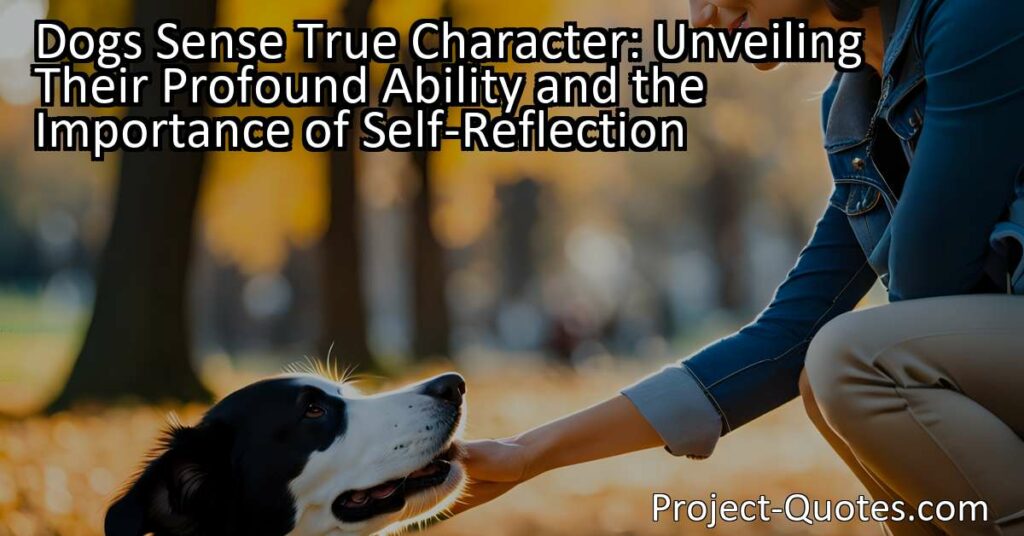If a dog will not come to you after having looked you in the face, you should go home and examine your conscience.
Woodrow Wilson
Dogs Sense True Character: Unveiling their Profound Ability and the Importance of Self-Reflection Dogs have a remarkable ability to sense our true character and authenticity, going beyond appearances and social status. When a dog refuses to approach us, it is often a reflection of their intuition detecting deception or hidden agendas. This quote emphasizes the importance of self-reflection and examining our conscience to strive for personal growth and be more compassionate individuals.
Table of Contents
- 1 If a dog will not come to you after having looked you in the face, you should go home and examine your conscience.
- 2 Woodrow Wilson
- 3 Meaning of Quote – If a dog will not come to you after having looked you in the face, you should go home and examine your conscience.
- 4 Freely Shareable Quote Image
- 5 Related
Meaning of Quote – If a dog will not come to you after having looked you in the face, you should go home and examine your conscience.
Have you ever noticed how dogs seem to have an innate ability to sense our true character? They can easily read through our façades and perceive the authenticity of our intentions. The quote, “If a dog will not come to you after having looked you in the face, you should go home and examine your conscience,” captures the essence of this remarkable canine ability. In this expansion, we will explore the profound meaning behind this statement and delve into the significance of examining one’s conscience.
Dogs have been our loyal companions for centuries, and throughout history, they have consistently demonstrated their unwavering loyalty and affection. They have evolved alongside humans, learning to decipher our emotions, intentions, and even our moral compass. Unlike humans, dogs do not judge us based on our appearances, wealth, or social status. Instead, they connect with our true selves, focusing on the authenticity of our character.
When a dog refuses to approach us after looking us in the face, it is often a reflection of their instinctual ability to detect insincerity or hidden agendas. They can sense when someone is being disingenuous, harboring negative intentions, or manipulating others for personal gain. If such a situation arises, the quote suggests that it is not the dog who should be blamed, but the individual in question who should reflect upon their conscience.
Reflecting on one’s conscience is an essential aspect of personal growth and moral development. It involves taking a step back from our daily lives and critically examining our thoughts, actions, and motivations. In the context of the quote, it implies that if a dog refuses to come to us, it is a sign that we may need to reevaluate ourselves and our behavior towards others.
First and foremost, examining your conscience means questioning the truthfulness and sincerity of your intentions. Are you being honest and genuine in your interactions with others, or are you putting on a façade to manipulate or deceive? Dogs, with their remarkable sense of intuition, can easily detect when someone is being disingenuous. They are drawn to those who exhibit kindness, empathy, and integrity qualities that reflect a clear conscience.
Furthermore, examining your conscience involves reflecting on your treatment of animals and other living beings. Dogs are highly perceptive when it comes to how they are treated, and they respond accordingly. If a dog refuses to come to you, it may be a sign that they have observed your mistreatment or neglect of other animals. This can prompt you to question your behavior and consider making changes to ensure the wellbeing and respect of all living creatures.
In addition to our actions towards animals, the quote encourages us to examine our conscience in relation to how we treat our fellow humans. Are we treating others with kindness, respect, and empathy, or do our actions reflect selfishness, judgment, or indifference? Dogs are sensitive to the energy we emit, and they gravitate towards those whose actions align with their positive nature. If a dog refuses to come to us, it may be a gentle reminder to evaluate our interactions with others and strive to be more compassionate and understanding.
Examining our conscience also involves reflecting on any harm we may have caused, intentionally or unintentionally. Dogs can sense when someone has caused pain or hurt in the past, and their hesitation to approach may be a response to such perceived negativity. This gives us an opportunity to confront our mistakes, seek forgiveness, and take necessary steps to make amends.
Moreover, the quote highlights the importance of self-reflection and introspection. Taking the time to look within ourselves allows us to identify our flaws, biases, and areas for improvement. It encourages us to question our prejudices, challenge our preconceived notions, and strive for personal growth. Dogs, with their unconditional love and non-judgmental nature, can serve as our guides in this journey of self-discovery.
In conclusion, the quote “If a dog will not come to you after having looked you in the face, you should go home and examine your conscience,” conveys a profound message about the perceptive nature of dogs and the significance of introspection. Dogs possess a unique ability to see through our masks and connect with our true character. When a dog refuses to approach us, it serves as a reminder to evaluate ourselves, our intentions, and our actions towards others. By examining our conscience, we can strive to be more authentic, kind, and compassionate individuals. So, next time a dog hesitates to come to you, take a moment to reflect on yourself and embark on a journey of self-improvement guided by the wisdom of our furry friends.
I hope this quote inspired image brings you hope and peace. Share it with someone who needs it today!


